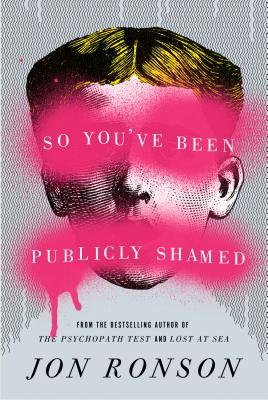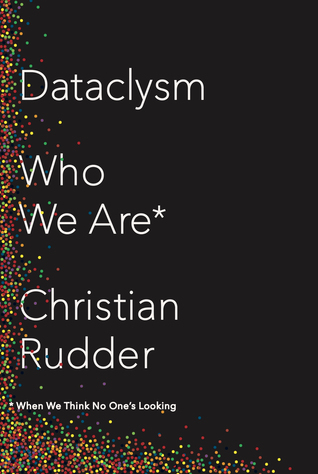So You've Been Publicly Shamed by Jon Ronson
This should be required reading for anybody with an internet connection, and for anybody in journalism 101. I'm definitely assigning it as a text book if I ever teach social media 101*. Jon Ronson investigates several recent episodes of frightening public humiliation such as Jonah Lehrer's made-up Bob Dylan quotes in Imagine, and Justine Sacco's tweet in poor taste that cost her the job of her dreams and earned her death threats and a waking nightmare. His examination of the disproportionately high price some have paid for a bad joke that went viral, and the possibility of forgive-and-forget in the digital age, is insightful and riveting.
*A distinct job possibility in this day and age.
Dataclysm by Christian Rudder
This book is a fascinating look at all of the things our data trail says about us. The author is co-founder of OKCupid, a popular matchmaking website, so much of his data comes from his own customers (he openly admits to having experimented on them). Full disclosure: I met my mate on OKCupid several years ago. We are not just a couple of people who met on the internet now-- we are Data. We exist in some endless spreadsheet of profiles and preferences, probably being salivated over by marketing gurus who want to sell us very specific, irresistible things. OKCupid is an attempt to find a formula for kismet. It's free, and makes it easy to find a like-minded, introverted companion, especially if you're the sort of person who needs an algorithm to get a date (like me). The result of making life decisions in such an instantly graph-able way is that all of my demographic information, along with my clicks and "likes" and mouse hovers, and digital whatevers, all get added up to create a prediction of what people like me are like, and what we like to "like". It's creepy, and yet somehow comforting. Rudder's methods and conclusions are fascinating, and he applies just enough wit to make this highly readable.
Modern Romance by Aziz Ansari
This book about dating in the digital age is basically Dataclysm with a sense of humor (Rudder is credited in the acknowledgements). The most memorable part of the book for me is his opening anecdote, one that those familiar with his act will know, which is possibly the best illustration ever of the cliffhanger anxiety brought on by the text ellipses used to indicate that your partner in textversation is typing a response (...): Ansari meets a single woman at a party and they bond over many common interests including a shared love of the band Beach House (I can relate--Beach House is everything, check out their album, Myth, if you don't believe me). They swap numbers, they text. Soon after meeting, he invites the woman to a Beach House concert. It looks like she's about to respond ...there's those three little dots...then...crickets. Nothing. No response. Dead air.
The audio book is great, especially if you love Ansari--he reads it--but I found the text to be surprisingly dry and a bit academic at times, lightened with bouts of that trademark Aziz Ansari comic tenderness.



No comments:
Post a Comment